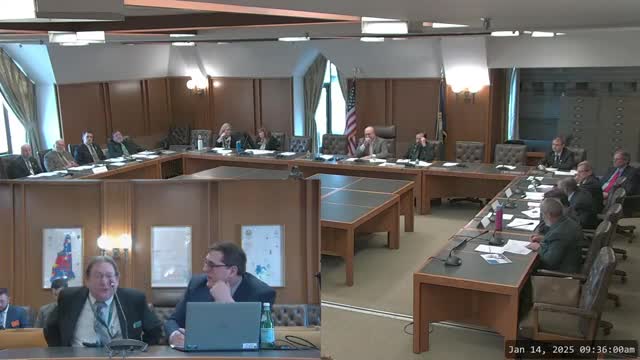DES Air Resources Division briefs committee: 13 monitors, PFAS work, RGGI funds and $450M heat‑pump grant for region
Get AI-powered insights, summaries, and transcripts
Subscribe
Summary
Air Resources Division director Craig Wright told lawmakers the division runs 13 monitoring sites, enforces 600 air toxics and implements Federal Clean Air Act programs; DES said New Hampshire participates in RGGI and is part of a five‑state EPA award for heat‑pump acceleration, with New Hampshire expected to receive roughly $40–45M.
The Air Resources Division (ARD) of the Department of Environmental Services briefed the Science, Technology and Energy Committee on Jan. 14 on monitoring, permitting, enforcement and climate programs. “We operate a network of 13 monitoring sites across the state,” ARD Director Craig Wright told the panel.
What ARD does. Wright said ARD enforces state law and implements the Federal Clean Air Act, maintains 12–13 monitoring stations (some “encore” multi‑pollutant sites), issues state and federal air permits, runs inspections and enforces standards for more than 600 state‑listed air toxics under RSA 125i. He noted staffing pressures (65 full‑time positions, about 11 vacancies) and that fee and federal funding cover most operations while general funds are a small share of the division budget.
Monitoring, trends and public health. Wright said New Hampshire is currently in attainment with national ambient air quality standards and the division is in “maintenance” mode, but noted episodic challenges such as trans‑boundary wildfire smoke. ARD’s monitoring priority list centers on ozone, fine particulate matter and regional haze at national park “Class I” areas; particulate- and ozone‑focused monitoring informs emergency messaging for public health.
RGGI, federal grants and heat‑pump funding. ARD summarized regional greenhouse gas initiative (RGGI) mechanics and said states that auction allowances reinvest proceeds; Wright argued that being in RGGI returns funds to states to offset costs. ARD staff also discussed a $3 million EPA grant that prepared a regional submission which led to a $450 million EPA implementation award for an East‑coast heat‑pump accelerator; DES expects New Hampshire to receive roughly $40–$45 million of that regional award for mid‑stream incentives and community projects.
Permits and staffing. Wright said ARD processes titles‑V and other air permits (700 permanent sources; about 120 permit applications a year), and faces time‑to‑permit targets imposed by recent legislation; the division acknowledged workforce constraints limit quick turnaround.
PFAS and air. ARD toxicologist Kathy (Catherine) Beam briefed the committee on PFAS in air. She said Senate Bill 309 (2018) authorized DES to regulate air emissions that “cause or contribute to groundwater or surface water PFAS violations.” Beam noted DES issued a permit to Saint‑Gobain Performance Plastics in Merrimack that required controls and multi‑year stack testing; the facility later closed. Beam said DES is assembling a stack‑testing plan for potential devices that treat PFAS‑containing wastes (incinerators, biosolids processors and landfill gas systems) and is evaluating whether to pursue air‑emissions rulemaking tied to PFAS precursors.
Why this matters. The ARD presentation underscored tradeoffs: A small regulatory staff must maintain compliance with federal air standards and respond to emerging contaminants such as PFAS while implementing major regional climate and energy programs that rely on federal funding; staff shortages create bottlenecks for permitting and monitoring expansion.
Ending. ARD asked the committee to recognize staffing constraints and the need for sustained funding for monitoring and technical work as the state implements new programs and responds to public‑health and climate‑related air quality challenges.
